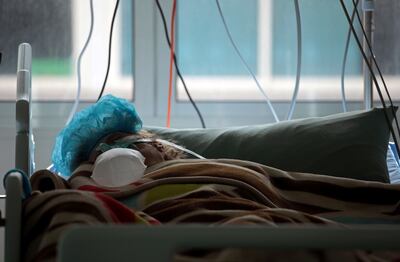Live updates: follow the latest news on Covid-19 variant Omicron
Economic crisis has left Lebanon less prepared for the Omicron variant of Covid-19 than it was for previous mutations of the virus, the country’s health minister has told The National.
Firas Abiad said the departure of many doctors and nurses, and soaring prices had left the country vulnerable to the latest variant, which has prompted several countries to reintroduce restrictive measures including travel bans.
“We have a lot of people who have left the country, whether doctors or nurses,” Dr Abiad said.
“With the change in the exchange rate, with the deterioration in the economy, and our financial numbers. That means that expenses have skyrocketed for the hospitals.
“So hospitals are less prepared. I think this is something that is very important.”
Dr Abiad said the Omicron variant posed risks that compared with the Alpha variant, which caused a huge increase in the number of deaths and patients needing hospital care across Lebanon in January.
But he said there had been some improvements in Lebanon despite the crisis.
Lebanon, he said, now had the capability to conduct genome sequencing, which meant it could track specific mutations of the virus more accurately. The technology, which was introduced to the country six months ago with the support of the World Health Organisation, was unavailable when the country battled the peaks of the Alpha and Delta variants.
Dr Abiad was also optimistic about vaccination rates in vulnerable communities and said the government would be stepping up its booster vaccine campaign targeting high-risk groups.
“If you look at the percentage of vaccinated in our elderly population who are most vulnerable, we have a very high penetration of vaccination among them and now we are accelerating the booster shot to them as well,” he said.
The Ministry of Health is also working to increase hospital capacity by 30 per cent, Mr Abiad said.
Lebanon has yet to register a case of the Omicron variant, which led many countries to ban flights from several southern African countries last week.

Though there are no direct flights from South Africa to Lebanon, he said the government had left its options open in terms of further tightening restrictions.
“If we want to escalate measures, then obviously here we're talking about travel bans,” he said.
He said the government did not yet have access to sufficient data to plan a response to the new variant.
“If you act without this information, your decision will be less accurate,” he said.
“Our condition means that we have to look at several things at the same time. We have to look at the conditions of our healthcare system, but we have to look at other issues such as the economy and all of these things.”
Dr Abiad received widespread acclaim in his previous position as head of Rafik Hariri University Hospital, the country’s largest public hospital. He was appointed Minister of Health by Prime Minister Najib Mikati in September.


